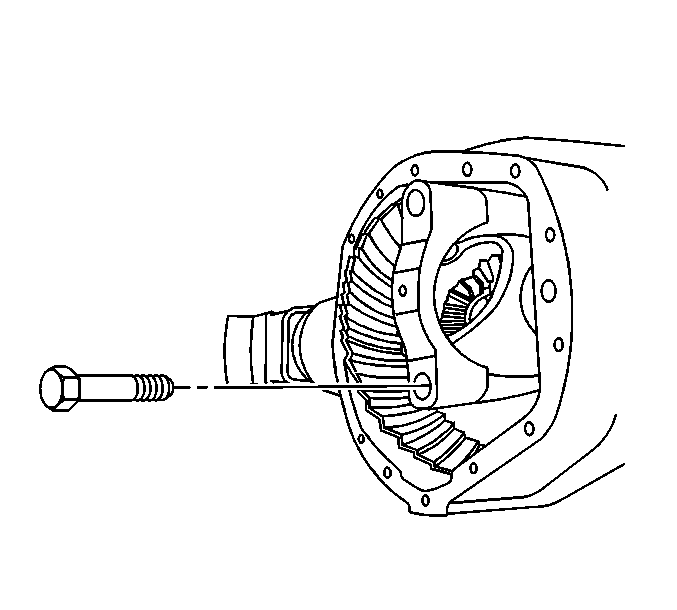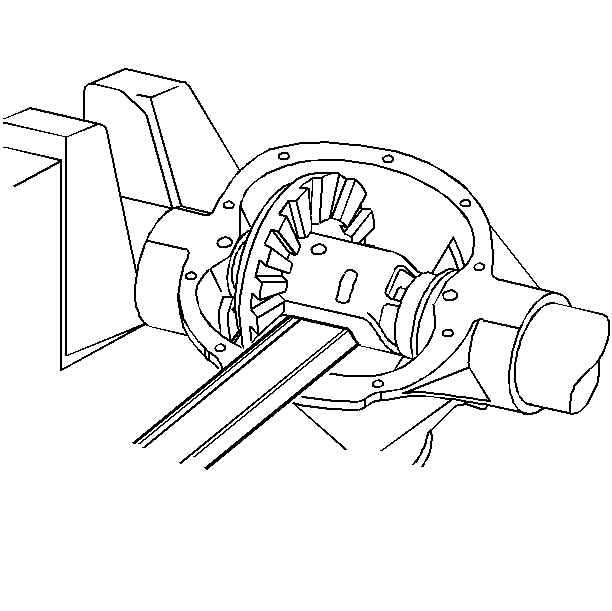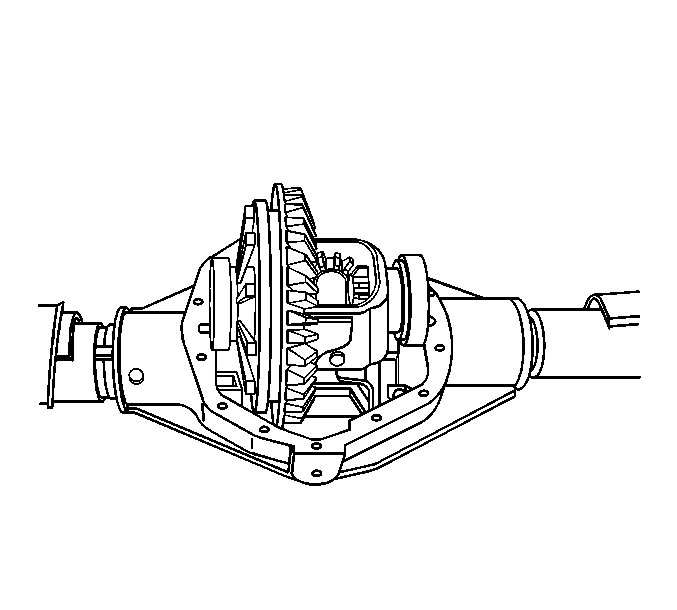Removal Procedure
Important: Group and mark the shims together as originally removed. If you remove or replace the ring and pinion gearset, perform the bearing preload, backlash, and gear tooth contact pattern check in order to ensure proper contact of the gears. If you reinstall or replace the differential carrier without replacing any other component (i.e. pinion and ring gear set, bearings. etc.) then you may reinstall the carrier with the original shims in their original locations. Always perform a gear tooth contact pattern check, even when you remove only the carrier.
- Raise the vehicle. Refer to Lifting and Jacking the Vehicle in General Information.
- Remove the tires and wheel assemblies. Refer to Tire and Wheel Removal and Installation in Tires and Wheels.
- Remove the brake calipers. Refer to Rear Brake Caliper Replacement in Disc Brakes.
- Remove the brake rotors. Refer to Rear Brake Rotor Replacement in Disc Brakes.
- Remove the rear axle housing cover and the gasket. Refer to Rear Axle Housing Cover and Gasket Replacement .
- Remove the axle shafts. Refer to Rear Axle Shaft Replacement .
- Remove the bearing caps and bolts. Mark the bearing caps left and right.
- Remove the differential by prying the differential from the axle housing at the differential window.
- Remove the differential assembly.
- Remove the bearing cups, the shims, and the spacers as necessary.
- Remove the differential side bearings, if necessary. Refer to Differential Side Bearings Replacement .
- Remove the ring gear, if necessary. Refer to Drive Pinion and Ring Gear Replacement .

Caution: To prevent personal injury and/or component damage, support the differential case when removing the case from the axle housing. If the case is not supported, the differential case could fall and cause personal injury or damage to the differential case.
Notice: When removing the differential case from the axle housing, do not damage the cover gasket surface. If the cover gasket surface is damaged, lubricant may leak from the axle and cause premature failure of the axle assembly.

Mark the cups and shims left and right and in the proper order as necessary. Place the cups and the shims with the bearing caps.
Installation Procedure
- Install the ring gear, if necessary. Refer to Drive Pinion and Ring Gear Replacement .
- Install the differential side bearings, if necessary. Refer to Differential Side Bearings Replacement .
- Lubricate the differential side bearings with axle lubricant. Use the proper fluid. Refer to Fluid and Lubricant Recommendations in Maintenance and Lubrication.
- Place the case, with the bearing cups installed, into the axle housing.
- Install the bearing caps and the bolts.
- Adjust the differential side bearing preload. Refer to Differential Carrier Bearing Preload Adjustment .
- Adjust the backlash. Refer to Backlash Adjustment .
- Perform a gear tooth contact pattern check. Refer to Gear Tooth Contact Pattern Inspection .
- Tighten the bearing cap bolts.
- Install the axle shafts. Refer to Rear Axle Shaft Replacement .
- Install the rear axle housing cover and a new gasket. Refer to Rear Axle Housing Cover and Gasket Replacement .
- Install the brake rotors. Refer to Rear Brake Rotor Replacement in Disc Brakes.
- Install the brake calipers. Refer to Rear Brake Caliper Replacement in Disc Brakes.
- Install the tire and wheel assemblies. Refer to Tire and Wheel Removal and Installation in Tires and Wheels.
- Fill the axle with lubricant. Use the proper fluid. Refer to Approximate Fluid Capacities and Fluid and Lubricant Recommendations in Maintenance and Lubrication.
- Lower the vehicle.

Support the case in order to keep the case from falling out of the axle housing.

Do not torque the bearing cap bolts at this time.
Notice: Refer to Fastener Notice in the Preface section.
Tighten
Tighten the bearing cap bolts to 75 N·m (55 lb ft).
